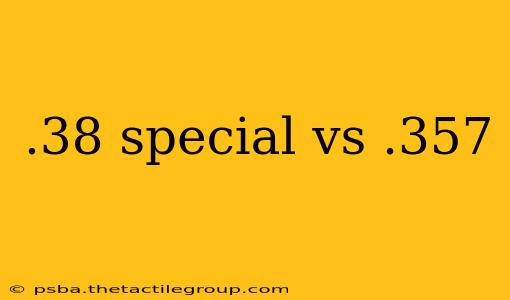Choosing the right handgun cartridge is a crucial decision, particularly for self-defense or target shooting. Two frequently compared calibers are the venerable .38 Special and the powerful .357 Magnum. While seemingly similar, these rounds offer distinct ballistic properties and applications. This detailed comparison will help you understand the key differences and determine which cartridge best suits your needs.
Understanding the Calibers: A Historical Perspective
The .38 Special, adopted by the U.S. Army in 1898, boasts a long and storied history in law enforcement and civilian circles. Its relatively low recoil and manageable power made it a popular choice for decades. However, advancements in firearms technology eventually led to the development of the .357 Magnum in 1935. Designed with a longer cartridge case, the .357 Magnum delivers significantly more power. Interestingly, the .38 Special is actually a shorter, less powerful round that can be fired safely in a .357 Magnum revolver. This backward compatibility is a significant advantage for owners of .357 Magnum revolvers.
Ballistic Performance: Power, Recoil, and Accuracy
The most significant difference between these two cartridges lies in their ballistic performance:
Power and Penetration:
-
.357 Magnum: Delivers significantly higher velocity and energy, resulting in greater stopping power and deeper penetration. This makes it a more effective choice for self-defense against larger threats or situations requiring more penetration through barriers.
-
.38 Special: Offers less stopping power and penetration than the .357 Magnum. However, its milder recoil makes it more controllable for less experienced shooters. This makes it ideal for target practice and situations where excessive stopping power isn't crucial.
Recoil:
-
.357 Magnum: Exhibits considerably more recoil than the .38 Special. This can be challenging for novice shooters and lead to faster fatigue during extended shooting sessions.
-
.38 Special: The noticeably lighter recoil contributes to greater accuracy and control, particularly for extended shooting sessions. It’s also easier on the shooter's wrists and hands.
Accuracy:
Both calibers are capable of excellent accuracy when fired from properly maintained revolvers. However, the lighter recoil of the .38 Special generally leads to marginally better accuracy for some shooters, especially during rapid firing.
Applications: Self-Defense vs. Target Shooting
The ideal application for each caliber depends on individual needs and preferences:
Self-Defense:
-
.357 Magnum: The higher stopping power and penetration make it a more potent self-defense round, particularly when facing larger, more aggressive threats. However, the stronger recoil requires more practice to master and might not be ideal for everyone.
-
.38 Special: Though less powerful, the .38 Special provides adequate stopping power in many self-defense situations. Its manageable recoil makes it easier to shoot quickly and accurately under stress. With appropriate ammunition selection, its effectiveness can be significantly enhanced.
Target Shooting:
-
.357 Magnum: While effective, the higher recoil can be cumbersome for extended target practice. The cost of ammunition can also be a factor.
-
.38 Special: The lower recoil and reduced cost of ammunition make it a more popular choice for target shooting and practice. It allows for more practice at a lower cost.
Ammunition Selection: A Crucial Consideration
The performance of both calibers is heavily influenced by the type of ammunition used. Factors such as bullet weight, type (jacketed hollow point, full metal jacket, etc.), and muzzle velocity all affect accuracy, stopping power, and penetration. Thorough research and testing are essential to find the best ammunition for your specific needs.
Conclusion: The Right Choice Depends on Your Needs
Ultimately, the choice between .38 Special and .357 Magnum depends on your individual requirements and priorities. The .357 Magnum offers greater stopping power and penetration but with increased recoil. The .38 Special provides manageable recoil and lower cost of ammunition, making it ideal for practice and less demanding situations. Carefully consider the factors discussed here to choose the caliber that best aligns with your needs and skill level.

